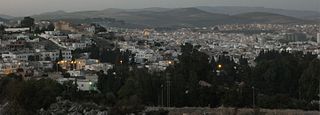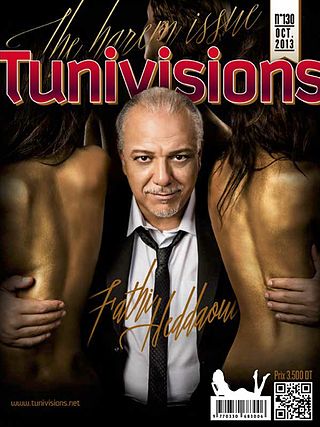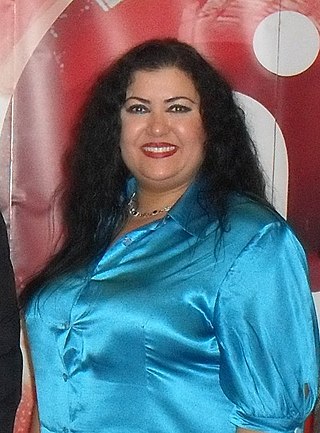Fadhel Jaziri | |
|---|---|
 | |
| Born | 1948 |
| Nationality | Tunisian |
| Occupation(s) | actor and film director. |
Fadhel Jaziri (born 1948) is a Tunisian actor and film director. [1]
Fadhel Jaziri | |
|---|---|
 | |
| Born | 1948 |
| Nationality | Tunisian |
| Occupation(s) | actor and film director. |
Fadhel Jaziri (born 1948) is a Tunisian actor and film director. [1]
Fadhel Jaziri was born in the medina of the Tunisian capital in 1948 to an upper-middle-class family who used to run a fez-making business. In addition to other businesses related to hospitality industry, Jaziri's father had a bookshop in the neighborhood of Bab Souika. Young Fadhel thus had the opportunity to meet and be influenced by the men of arts, theatre and politics that his father often had the pleasure of receiving. Fadhel Jaziri attended the modern Sadiki College where he had a freshman's experience with a student theatrical group which also included the Tunisian actor Raouf Ben Amor. During the 1968 events, Jaziri was very active and participated in the demonstrations taking place in Tunisian campuses where he even delivered speeches. His young man's rage against repression and political corruption led to his dismissal from the Faculty of Arts before finishing his diploma in philosophy. Fortunately for him, he soon received a scholarship to study in the English capital along with a number of other promising young Tunisians.
Jaziri's very first experience on stage was at the Ibn Khaldoun Palace of Culture in Tunis with the outstanding Tunisian actor Ali Ben Ayed when he had to play a walk-on part in Murad III. However, upon his return from London in 1972, Jaziri cofounded the theatrical group of Gafsa known in French as “Théâtre du Sud”. The team included Tunisia's most recognized theatre stars such as Fadhel Jaibi , Raja Farhat, Jalila Baccar and Mohamed Driss. In Tunis, Jaziri and Jaibi later launched the “Nouveau Théâtre de Tunis” and produced a number of plays that would become major classics of Tunisian drama.
In 2007, Fadhel Jaziri directs Thalatun (meaning 30 in Arabic), a movie received with much praise and which depicts Tunisian life in the 1930s. The main heroes of Jaziri's opus are three immanent figures that have a very special place in Tunisian history and culture. They are the social reformer Tahar Haddad, the trade-unionist Mohamed Ali El Hammi and the poet Abu Al Kacem Chebbi. However, what has really made Fadhel Jaziri's fame in Tunisia and in the world was mainly his direction of the major musical shows known in Arabic as Nouba and Hadhra. These two works are of tremendous importance to the Tunisian audience as they represent the finest compilations of two basic genres of Tunisian folk music. Jaziri and his partners in the projects have helped immortalize sounds and voices that echo sagas of Tunisia's Berber, Arabic and Islamic roots. Nouba compiles old Tunisian folk songs and compositions that are marked by the prominent Berber bagpipe sound. The lyrics often deal with subjects related to love, celebration, nature, and old traditions, which is the case with “Between Rivers” by the late folk singer Ismail Hattab. Hadhra is rather a compilation of mystic music from Tunisian Sufi Tariqas. Most of the songs celebrate and praise ancient Sufi saints and sages in addition to the praise for Allah and Prophet Muhammad. Both shows feature hundreds of folk singers and instrumentalists, which greatly contributes to the aura of originality and grandeur.
Tunisia is a North African country with a predominantly Arabic-speaking population. The country is best known for malouf, a kind of music imported from Andalusia after the Moors expulsion in the 15th century. Though in its modern form, malouf is likely very dissimilar to any music played more than four centuries ago, it does have its roots in Spain and Portugal, and is closely related to genres with a similar history throughout North Africa, including malouf's Libyan cousin, Algerian gharnati and Moroccan ala or Andalusi. During the Ottoman era, malouf was influenced by Turkish music. However, Tunisian repertoires, styles and also instruments remain distinctive – the ʻūd tūnsī is an emblematic case. This is a close relative of the 'uds associated with Algeria and also Morocco.

Tunisian Arabic, or simply Tunisian, is a variety of Arabic spoken in Tunisia. It is known among its 12 million speakers as Tūnsi, "Tunisian" or Derja to distinguish it from Modern Standard Arabic, the official language of Tunisia. Tunisian Arabic is mostly similar to eastern Algerian Arabic and western Libyan Arabic.

Béja is a city in Tunisia. It is the capital of the Béja Governorate. It is located 105 kilometers (65 mi) from Tunis, between the Medjerdah River and the Mediterranean, against the foothills of the Khroumire, the town of Béja is situated on the sides of Djebel Acheb, facing the greening meadows, its white terraces and red roofs dominated by the imposing ruins of the old Roman fortress.
Jaziri is an Arabic surname. Notable people with the surname include:

La Marsa is a coastal city located in the northeastern part of Tunisia, situated along the Mediterranean Sea. It is part of the Tunis Governorate and has a population of around 100,000 people. The city is known for its beaches, upscale residential areas, and lively atmosphere, with numerous restaurants, cafes, and shops. It is connected to Tunis by the TGM railway. Gammarth is adjacent to El Marsa further up the coast.

M'saken is a town in north-eastern Tunisia, close to Sousse.
Mohamed Driss is a Tunisian writer, actor, and director of theatre. Since 1988 he has been the director of the National Theatre of Tunisia.

Mohamed Fadhel Ben Achour was a Tunisian theologian, writer, trade unionist, intellectual and patriot born in La Marsa.
The Turks in Tunisia, also known as Turco-Tunisians and Tunisian Turks, are ethnic Turks who constitute one of the minority groups in Tunisia.
Mahmoud Ben Mahmoud is a Tunisian film writer and producer.

Mounir Troudi is a jazz and Sufi music singer from Tunisia.

Fethi Haddaoui is a Tunisian actor, director, writer and producer.

Othman Battikh was a Tunisian Islamic scholar and Grand Mufti of Tunisia from 2008 to 2013. He also served as member of the Tunisian government.
Anissa Daoud is a Franco-Tunisian actress, author and producer. Living between Paris and Tunis, she is part of the art collective Artists Producers Associates (APA).

Lotfi Abdelli is a Tunisian actor and comedian.

Mohamed Mrad is a Tunisian actor and model, best known for his role of Mahdi Ben Salem in the Television series Naouret El Hawa.
Kamel Touati is a Tunisian actor. He is best known for his role as Slimen Labyedh on the Tunisian Television series Choufli Hal.

Kawther El Bardi is a Tunisian actress.
Raouf Ben Amor is a Tunisian actor.

Jalila Baccar is a Tunisian playwright and actor.